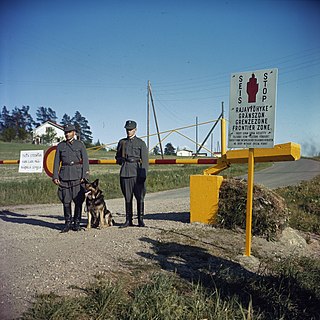
The Border Security Force (BSF) is a central armed police force in India under the Ministry of Home Affairs. It is responsible for guarding India’s borders with Pakistan and Bangladesh. It was formed in the wake of the Indo-Pakistani War of 1965 to ensure the security of India’s borders and for related matters.
The Indian Police Service is a civil service under the All India Services. It replaced the Indian Imperial Police in 1948, a year after India became independent from the British Empire.

Law enforcement in India is imperative to keep justice and order in the nation. Indian law is enforced by a number of agencies. Unlike many federal nations, the constitution of India delegates the maintenance of law and order primarily to the states and territories.
An inspector general is an investigative official in a civil or military organization. The plural of the term is "inspectors general".
Commandant is a title often given to the officer in charge of a military training establishment or academy. This usage is common in English-speaking nations. In some countries it may be a military or police rank. It is also often used to refer to the commander of a military prison or prison camp.

The Central Industrial Security Force (CISF) is a central armed police force in India under the Ministry of Home Affairs. CISF's primary mission is to provide security to large institutions, be it Governmental or private.
India maintains 10 paramilitary forces.

A border guard of a country is a national security agency that ensures border security. Some of the national border guard agencies also perform coast guard and rescue service duties.
The Superintendent of Police (SP) is a rank in Indian police forces held by an officer who serves as the head of a rural police district. Other officers of the same rank may lead specialised wings or units. In cities under commissionerate system, an SP and SSP may serve as the Deputy Commissioner of Police (DCP) under the Commissioner of Police. The SP coordinates with the district magistrate (collector), the administrative head of a revenue district, who has general control and direction over magistrates. Additionally, an SP sends monthly reports to the Director General of Police (DGP) through the Deputy Inspector General of Police (DIG) and the Inspector General of Police (IGP).

The Ministry of Home Affairs, or simply the Home Ministry, is a ministry of the Government of India. It is mainly responsible for the maintenance of internal security and domestic policy. It is headed by Minister of Home Affairs.

Gazetted officers include all the Indian Police Service officers which are Group A officers of the cadre and all State Police Services officers of and above the rank of Deputy Superintendent of Police. All are arranged in a hierarchical order.

Sardar Vallabhbhai Patel National Police Academy (SVPNPA) is the civil service training institution in India. The institute trains Indian Police Service (IPS) officers before they are sent to their respective state cadres to carry out their duties. The academy is in Shivrampalli, Hyderabad, Telangana, India.
Commandant is a military rank used in many - typically Francophone or Hispanophone - countries, where it is usually equivalent to the rank of major.

In India, the Central Armed Police Forces (CAPF) is the collective designation for the central police organizations under the Ministry of Home Affairs. Since 2011, the term "central armed police forces" has been adopted, replacing the term "paramilitary." The CAPF is responsible for internal security and border protection. Each force within the CAPF is led by a Director General (DG), typically an officer from the Indian Police Service (IPS), with the exception of the Assam Rifles, which is headed by a Lieutenant General-ranked officer from the Indian Army.
The State Armed Police Forces of India are the police units established for dealing with serious law and order situations requiring a higher level of armed expertise than normal. The State Armed Police Forces exist in addition to the ordinary police services of the various states.

Assistant Commandant is a title often given to the second-in-command of a military, uniformed service, training establishment or academy. This usage is common in English-speaking nations, and in some countries it may be a military or police rank.
The 7th Central Pay Commission (7CPC), constituted in February 2014 the principles and structure of emoluments of all central government civilian employees including defence forces in India, submitted its report on 19 November 2015. 7CPC's recommendations affects the organization, rank structure, pay, allowances and pension, of 13,86,171 armed forces personnel. This helps A salary monitoring system is designed to determine and suggest needed changes to the salaries of government employees.page 105, para 6.2.2[3]

Provincial Police Service, often abbreviated to as PPS, is the state civil service for policing of Uttar Pradesh Police comprising Group A and Group B posts. It is also the feeder service for Indian Police Service in the state.

Indian Armed Forces in Jammu and Kashmir encompass the Indian Army, Navy and Air Force, tri-service units such as the Armed Forces Special Operations Division (AFSOD), and paramilitary organisations of the Central Armed Police Forces such as the Border Security Force, the Central Reserve Police Force, the Sashastra Seema Bal and the Indo-Tibetan Border Police. Each three wings of India's military have their special forces deployed in the region including Indian Army's Para SF, the Indian Navy MARCOS and the Indian Air Force's Garud Commando Force. Apart from this, there is the elite police anti-insurgency force in the region, the Special Operations Group, of the Jammu and Kashmir Police.
In India, the police forces of the states and union territories are responsible for law enforcement in the states and union territories. Police and Public Order are State subjects under the Seventh Schedule to the Constitution of India.











